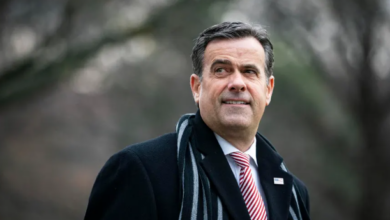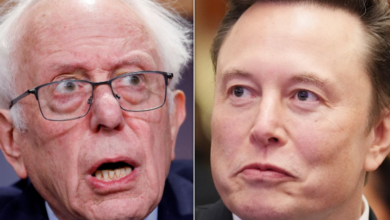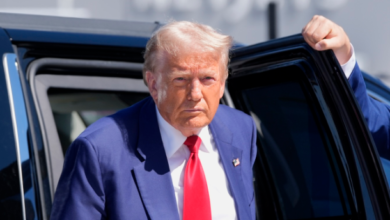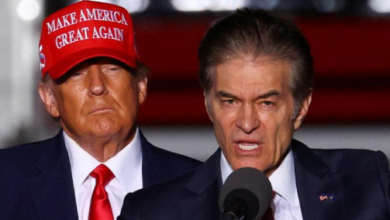Republicans Are Taking Bike Lanes Hostage In Their Quest To Stop A Progressive Prosecutor

Bike safety advocates in Pennsylvania have spent the past five years trying to convince lawmakers to change an outdated law to allow for safer bike lanes on state roads. This year, it seemed like they might finally prevail. A bill to amend the state’s vehicle code passed unanimously out of the state House and headed to the state Senate.
But instead of putting it up for a vote there, Republican lawmakers tied the previously uncontroversial bike lane bill to a completely unrelated GOP policy goal: undermining Philadelphia District Attorney Larry Krasner.
Republican lawmakers have worked to undermine Krasner since he was first elected in 2017 on a promise to reduce incarceration and dramatically reform the criminal justice system. This week, the GOP’s yearslong sabotage campaign reached a dramatic milestone when House Republicans filed articles of impeachment against Krasner, blaming the progressive prosecutor for an increase in crime in Philadelphia — a trend that has been occurring across the state and country.
Although Republicans control both chambers of the state legislature, they are unlikely to actually remove Krasner from office, which would require support from two-thirds of the Senate. Instead, they have tried to push a series of laws containing sneaky provisions that would strip Krasner of his ability to decide how and whether to prosecute certain crimes.
That’s where the bike lane bill comes in.
Pennsylvania’s Vehicle Code currently requires cars to park with their tires within 12 inches of a curb. This prevents the installation of parking-protected bike lanes, which sit between a curb and a parking lane, shielding bicyclists from moving traffic. Even the small number of parking-protected bike lanes that exist as part of a pilot program have been linked to increased ridership and a decrease in crashes and fatalities, according to a recent study.

RJ Sangosti/The Denver Post via Getty Images
A legislative fix to Pennsylvania’s vehicle code was introduced in 2017 but faced persistent resistance from state Sen. John Sabatina (D), who represented northeast Philadelphia. Last year, Sabatina resigned from the state Senate after being elected to the Philadelphia Court of Common Pleas, clearing the way for the bike lane bill to pass.
After passing unanimously in the state House last year, the bill moved to the Senate. In June, state Sen. Wayne Langerholc (R), who chairs the state Senate transportation committee and represents a district four hours outside of Philadelphia, quietly introduced an amendment just before the bike lane bill was scheduled for a committee vote. The amendment tasked the state’s attorney general with appointing a special prosecutor in counties “of the first class” to handle crimes committed on public transportation. A first-class county is defined as a county with a population of 1,500,000 or more, and there is only one in the state — Philadelphia County.
“We did not see it coming,” Sarah Clark Stuart, the executive director of the Bicycle Coalition of Greater Philadelphia, said in an interview. “It was never raised in any of the conversations that we had with the senator or his staff.”
The bike lane bill was amended again earlier this week to put a panel of judges, rather than the attorney general, in charge of selecting the special prosecutor. In case the intention of the amendment wasn’t explicit enough, the special prosecutor cannot be anyone who worked in the district attorney’s office during the time that Krasner was DA and cannot initiate any new proceedings after Dec. 31, 2025 — a week before Krasner’s term ends. That version passed the state Senate on a party-line vote.
If signed into law, the amended bike lane bill would result in a deeply undemocratic scenario in which lawmakers who do not represent Philadelphia voters have stripped a popular elected official of his ability to oversee certain cases. Instead, those cases would be handled by an appointed prosecutor whom voters didn’t elect.
Consider one example of how this might play out:
Abortion is currently legal in Pennsylvania up to 24 weeks of pregnancy, but far-right gubernatorial candidate Doug Mastriano has previously said women who get abortions should be charged with murder. If Republicans maintain control of the state House and Senate and have Mastriano as governor, it is conceivable that Pennsylvania could pass far more restrictive abortion laws. And even if Krasner declined to prosecute abortion-related crimes in Philadelphia, that decision may be out of his control. If, for example, a woman took public transportation to an abortion clinic, her case could fall within the jurisdiction of the special prosecutor created under the amended bike lane bill.
On Tuesday, the Bicycle Coalition of Greater Philadelphia and Bike Pittsburgh announced that, due to the Krasner-related amendments, they could no longer support the bike lane bill they had fought for so long to pass.
“What we saw was a fairly minor redefining of what a curb is in the vehicle code. This is fixing a technicality — and folks made it political,” Scott Bricker, the executive director of BikePGH, said in an interview. “It’s very disappointing to us because these types of safe street designs save lives, they encourage more people to ride, they encourage new people to take up bicycling, they prevent injuries. It’s really just a shame.”
In order to move to the governor’s desk, the amended version of the bike lane bill would need to pass another vote in the state House, which is unlikely to happen before the end of the legislative session on Nov. 30. Because of Republican lawmakers’ hamfisted attempt to undermine a democratically elected prosecutor’s policies, Pennsylvania cyclists most likely will not get their parking-protected bike lanes, a common-sense measure that could potentially save lives.
“What we saw was a fairly minor redefining of what a curb is in the vehicle code. This is fixing a technicality — and folks made it political.”
– Scott Bricker, executive director of BikePGH
The bike lane bill was one of several pieces of legislation Republican lawmakers have used to try to take away Krasner’s prosecutorial discretion. Another bill pushed by the GOP would give the state attorney general the ability to prosecute certain gun cases in Philadelphia County.
State Rep. Martina White (R), who announced the filing of articles of impeachment against Krasner earlier this week, managed to pass a similar version of this bill in 2019 by quietly slipping the language into the bill in the final days of the legislative session.
“I think the vast majority of my colleagues had no idea this was included,” a state House Democratic lawmaker told The Intercept at the time.
However, Pennsylvania Attorney General Josh Shapiro declined to use that law to undercut Krasner, and it expired in 2021 near the conclusion of Krasner’s first term.
Shapiro is now running for governor against Mastriano. If Shapiro wins that race, there will be a special election for state attorney general, and Republicans will have a shot at replacing Shapiro with a prosecutor who would be happy to strip Krasner of prosecutorial discretion.
Republicans also filed an amendment to a previously uncontroversial bill that would require law enforcement to make an effort to contact family members before publicly identifying a murder victim. The amendment, which was never voted on, would have allowed a panel of judges to appoint a special prosecutor to Philadelphia County to handle a broad range of crimes including car theft, illegal gun possession or sales, and “any other criminal matter” if the special prosecutor determines that Krasner has opted not to enforce all or part of a law.
It is unclear if either of the current legislative efforts to constrain Krasner will pass this session. But the focus on Krasner provides a convenient way for Republican lawmakers to sell a “tough-on-crime” message to voters days before the midterm elections — a convenient distraction from Republicans’ refusal to pass laws to restrict access to the guns used to kill the crime victims they claim to want to protect.
“Crime is a serious issue, and the DA takes it seriously ― as do the people who live in Philadelphia, members of City Council, and all others who were elected by Philadelphians to govern there,” said Jessica Brand, a spokesperson for Krasner’s office.
“It is why they are all begging legislators in Harrisburg to pass common sense gun control and to fund equitable schools,” Brand continued. “It’s why they are pushing for more job training and for services in all communities, not just the wealthy ones. That’s where the DA hopes the focus can be going forward, because that’s how we stop violence and build up communities.”
[ad_2]
Source link





